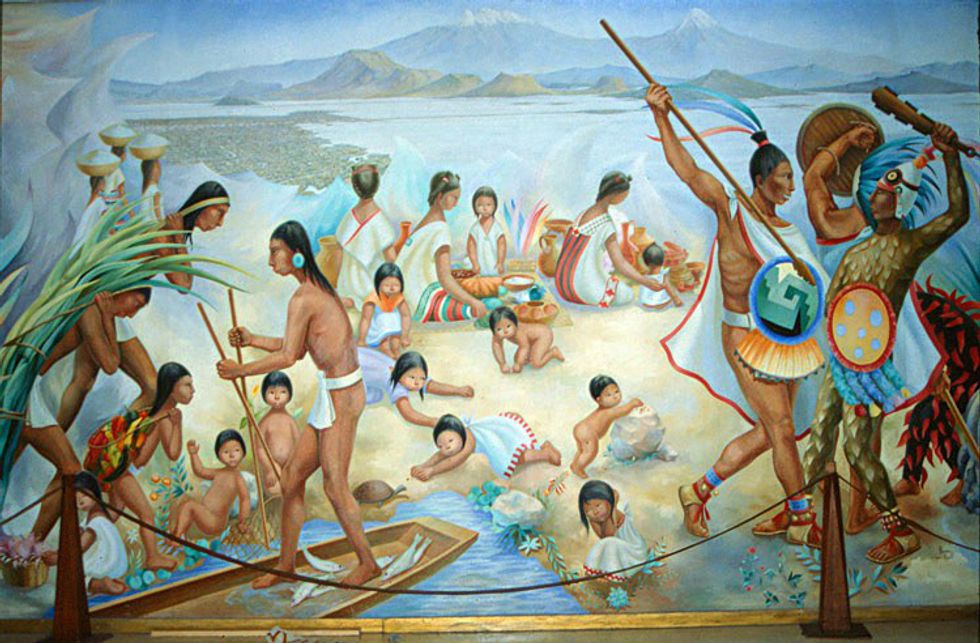Our roots create a significant image of who we are. Most everyone always expresses interest in knowing more about their relatives past, to compare with who and what we can relate to. It's an exciting thing to find out that who we are, and where we come from might tell a completely different and unique story about us. But for Mexicans, there seems to be a lot of confusion about our heritage. It's around Los Angeles and many other Mexican communities, and it's on the Mexican flag; symbolism and art that refer to the legacy of the Meso-American Aztecs is indeed an essential part of Mexican culture, from our food and stories to cultural language and religious tradition.
In recent times, there have been much more people of Mexican descent, especially Mexican-Americans in the United States, that disregard any European or Old-World ancestry and claim Aztec ancestry. There are many reasons behind this contemporary reconnection with heritage, among the most popular being decolonization. Decolonization is a multiple-faceted political philosophy, that focuses on finding one's ancestral indigenous roots to better economic practice, traditional philosophy, and even spiritual beliefs. However, the reality of Mexico's history and culture is much more complex than most people can imagine.
Most people know of the Aztecs but most people also tend to not know history before or around the people. But to begin with, who are a people? Are people grouped by a common language? By a shared nationality? By appearance, or blood type?
Before any Mexican says that Mexico used to be Aztec and that therefore all Mexicans have some "Aztec blood", the realities of the accepted history should be known. The "Aztecs" were a people grouped only by nationality and language, and they were fairly new and the last major state in a series of states of Mexico; They absorbed many different cultures, ethnic groups, and languages into their own empire, where many people today misattribute the accomplishments of others to the Aztecs. This is where Mexico's complex and historical culture come into play.
Sure, Mexico was once sans Spanish, European or Old World. In the midst of Mexico being so colonized with a culture that resembles an entirely foreign one, it's understandable that alienated people wanting to reconnect with their roots settle for the first non-European culture that they come across. But saying that one is part Aztec is much like saying that one's blood is American! The United States of America are a political union, where anybody can live and occupy. And surely, just because you speak English doesn't make you American. Similarly, the Aztec people are not related by blood, and certainly not related to the Aztec language, Nahuatl. So many attempt to study and learn Nahuatl in an attempt to strengthen their ancestral roots, but Nahuatl is only one of hundreds of indigenous languages of Mexico, with the majority of indigenous people collectively speaking a language that isn't Nahuatl.
Most people might also say that they are part Aztec because their parents and grandparents lived in Central Mexico, the expanse of the old Aztec empire. But migration to Central Mexico has only been economically viable since the majority of jobs and commerce and opportunity is found in either Central or Northern Mexico, but the United States border. Many have migrated to Mexico (the state), the Federal District, Morelos, and the other states of central Mexico (the country) from other regions of Mexico that were never touched by the Aztecs. Claiming Aztec ancestry just because recent generations lived there is folly since anyone from anywhere in Mexico could have moved there after the Aztec Empire was colonized 500 years ago.
But to actually refer to the indigenous people of Mexico: Mixe, K'iche, Nahua, Otomi, Zoque, Zapotec, Mixtec, Totonac. Tojolab'al, Huichol, Purepecha, Tarahumara, Mayo, Yaqui. Do any of these names sound familiar? These are just some of the other hundreds of groups of people actually related by both blood and language, a group of people that can actually be traced to since they aren't tied together by empire or lingua franca. And yet, most everyone claims Aztec ancestry. And with more and more Aztec and Nahuatl references becoming more popular in mainstream culture, it seems that it will take a while until more people begin to really investigate the full extent of their ancestral roots.
























